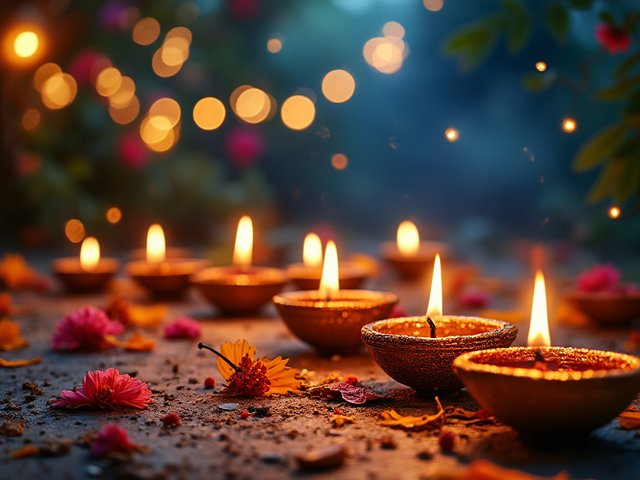Diwali: The Festival of Lights

Introduction
Diwali, also known as Deepavali, is one of the most significant festivals in the Hindu calendar. Celebrated not only in India but across the globe wherever the Indian diaspora resides, Diwali marks the victory of light over darkness, good over evil, and knowledge over ignorance. As we gear up for the festivities starting tomorrow, let's delve into the origins and stories behind this luminous festival.
The Origin of Diwali
The roots of Diwali can be traced back to ancient times, with multiple legends contributing to its significance:
Ramayana Story: Perhaps the most popular tale associated with Diwali is from the epic Ramayana. Lord Rama, an incarnation of Vishnu, along with his wife Sita and brother Lakshmana, returned to Ayodhya after 14 years of exile and defeating the demon king Ravana. The citizens of Ayodhya lit up their homes with diyas (oil lamps) to welcome their beloved prince, symbolizing the triumph of good over evil.
Krishna and Narakasura: Another legend involves Lord Krishna's defeat of the demon Narakasura, freeing 16,000 princesses held captive by the demon. This victory is celebrated as Diwali in some regions of India, highlighting the theme of liberation.
Goddess Lakshmi: Diwali also commemorates the marriage of Lakshmi, the goddess of wealth, with Lord Vishnu, emphasizing prosperity and the divine feminine energy.
Jainism: For Jains, Diwali marks the attainment of Nirvana by Lord Mahavira, the last Tirthankara, which symbolizes the ultimate enlightenment.
How Diwali is Celebrated
The celebration of Diwali lasts for five days, each with its own significance:
- Dhanteras - People buy gold or kitchenware, believing it brings good fortune.
- Naraka Chaturdashi or Choti Diwali - The day signifies the victory of Lord Krishna over Narakasura.
- Lakshmi Puja - The main day of Diwali, where homes are lit up, and Lakshmi is worshipped for prosperity.
- Govardhan Puja - Celebrates Krishna's lifting of the Govardhan hill to save the people from Indra's wrath.
- Bhai Dooj - A day to honor the bond between brothers and sisters.
During Diwali, families come together, houses are cleaned, and new clothes are worn. Fireworks, although controversial due to environmental concerns, are a traditional part of the celebration. Sweets and gifts are exchanged, and rangoli (colorful patterns made on the floor) adds to the festive decor.
The Significance Today
Beyond the legends, Diwali today represents:
- Unity: It's a time when families reunite, transcending geographical and cultural boundaries.
- Hope: Lighting lamps symbolizes the hope that light will prevail over darkness in our lives.
- New Beginnings: Many start new business ventures or investments on this day, seeking the blessings of prosperity.
Conclusion
As we light our diyas tomorrow, let's remember the profound messages Diwali carries - of joy, light, and the eternal fight against darkness. Whether you're lighting a lamp, enjoying sweets, or simply admiring the rangoli, Diwali's essence is in the spreading of happiness and the removal of ignorance.
May this Diwali fill your life with the glow of joy, peace, and prosperity. Happy Diwali to all!
If you enjoyed this post, please upvote, comment, and follow for more cultural insights and festive celebrations. Let's keep the light of knowledge burning bright!